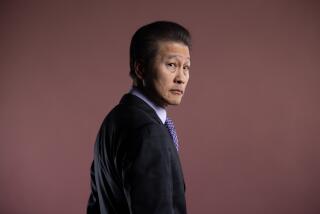LOCAL ELECTIONS / L.A. MAYOR : Woo Lauded by Bankers Amid Cathay Controversy
- Share via
Hoping to minimize political fallout from the lending record of a Chinatown bank with ties to his campaign and family, Los Angeles City Councilman Michael Woo lined up several minority banking executives Friday to praise his role in creating a bank consortium to make loans to African-Americans.
The Times reported last week that Cathay Bank in 1991 made only one of its 121 home loans to a Latino and none to African-Americans. More than 97% of the Chinatown-based bank’s loans in 1991 went to Asian-Americans.
Woo’s campaign for mayor has stressed his efforts to boost minority community investment through a consortium of Asian-American and black financial institutions that could pool loan capital. He has used the group to pitch himself to minority voters, particularly African-Americans.
Woo’s father is on the bank’s board of directors and was a longtime vice president of Cathay. The bank’s executives have solicited political funds for Woo’s campaign, and the councilman, who held Cathay stock until last year, authored an official city commendation of the bank in 1987.
However, the candidate has never been an officer of the bank and said he has stayed out of the institution’s decision making. He also emphasizes that Cathay is a part of the fledgling consortium he helped set up to steer loans to African-American businesses.
Rival mayoral candidate and City Councilman Joel Wachs seized on the issue this week, urging three public agencies to withdraw about $10 million they have deposited with Cathay. Wachs also labeled Woo “a charlatan” and said Cathay’s record conflicts with the new consortium’s goals.
At a Friday news conference organized by Woo’s campaign, the consortium’s acting head, Philip Borden, said Woo had a central role in creating the 26-bank group, the L.A. Bank Clearinghouse.
He said the consortium, formed after last year’s riots, is close to making a $4-million loan to a black-owned packaging firm that employs 100 people. Several other loans to African-American companies are in the works, using consortium capital, he said.
Borden said that, while other city officials were not helpful, Woo telephoned bankers to urge them to join it and assigned his City Hall staff to help it organize.
“There’s never been a meeting where members of his staff haven’t been there, and there’s been several meetings where he himself attended,” said Borden. “Without him, we wouldn’t go anywhere. . . . To me, he has taken a bad rap.”
Robert W. Brown, a black attorney who said he has represented several major banks, said Woo helped establish “effective communication” between Asian-American and African-American bankers after the riots.
Brown also defended Cathay’s lending practices, saying it is not unusual for a community bank to make most of its loans nearby.
“It is not fair to necessarily infer that discrimination exists and also that people outside the (Chinatown) community are not invited to apply for loans,” he said.
Cathay said it received no loan applications from African-Americans in 1991 and 1992, and only 11 from Latinos. Advocates pushing banks to broaden their lending practices say that banks often do so when legally challenged.
More to Read
Sign up for Essential California
The most important California stories and recommendations in your inbox every morning.
You may occasionally receive promotional content from the Los Angeles Times.













